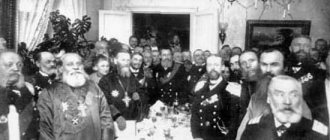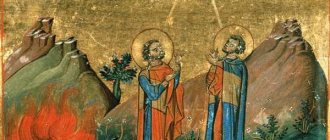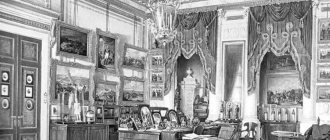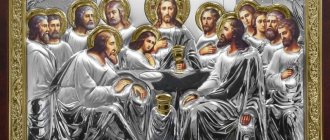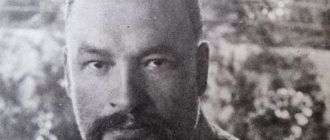Holy Martyr Justin the Philosopher and those who suffered with him
Memory 1/14 June
From the book “Synaxarion: Lives of the Saints of the Orthodox Church,” published by the Sretensky Monastery Publishing House.
***
Saint Justin[1] was born at the beginning of the 2nd century. His homeland was the city of Flavia Neapolis[2], founded by the Romans after the conquest of Jerusalem on the site of the biblical Shechem. Justin came from a family of wealthy pagans. His parents provided him with a thorough education. Eager to find the truth, he met with various philosophers, but this brought him only disappointment - he realized that philosophers could not tell him anything satisfactory about God.
Finally, he joined the famous Neoplatonist, who inspired him with the doctrine of ideas and the spiritual world, glorified by Plato. After some time, he, already considering himself a sage and wanting to see God face to face, as the philosopher promised him, headed to a secluded and quiet area on the seashore to indulge in meditation there. Walking along the shore and immersed in thought, he suddenly saw a worthy and majestic old man, meek and at the same time strict. They started talking to each other.
Justin began to praise philosophy as the highest and most precious occupation of mankind, in comparison with which all other human affairs are worthy of contempt. Then the elder asked him how philosophers could form a true idea of God without having experience communicating with Him. When Justin replied that the mind can see God, the elder objected that the mind receives this ability only when endowed with the Holy Spirit, having previously been purified by exercise in virtue. In addition, he refuted Plato’s doctrine of the soul and reincarnation and proved to Justin that it is impossible to substantiate the idea that the world is supposedly eternal and uncreated, because only God is unborn and incorruptible, one and always identical with Himself. About the soul, he said that, in contrast to Plato’s opinion, life is not inherent in it in itself, but only to the extent that the soul participates in the life given by God.
Justin, inspired by these words, asked the elder which mentors he should turn to in order to learn this truth, unknown to the sages of bygone times. He replied that this teaching belongs to great people who lived before the philosophers - the righteous and saints of God, who spoke by the Holy Spirit and uttered prophecies that have now come true - they are called prophets. Filled with the Holy Spirit, they spoke and proclaimed only what they saw and heard, without resorting to sophisticated evidence. Testifying to the truth, they glorified the One God and Father and proclaimed Christ who had come from Him with signs and writings. In conclusion, the elder said: “And first of all, pray that the gates of light will be opened to you, for no one can see and perceive God unless God and His Christ make man understand this.”
As soon as the elder left, an ardent love for these prophets and sages - the friends of Christ - arose in the soul of the young philosopher. Pondering over the words he heard, he realized that this teaching was the only true and beneficial philosophy for the soul, and decided to join the disciples of Christ, whom he had long admired for their contempt for torture and death. After baptism, he began to study the Holy Scriptures in Palestine. Then, without parting with his cloak and beard - the distinctive signs of philosophers, Justin went to Asia Minor to instruct others in the true philosophy of the prophets and apostles.
Around 136, when the Romans crushed the Jewish uprising in Palestine, he met with the respected Rabbi Tryphon and talked with him for two days[3]. Justin, with the help of numerous quotations from Scripture, proved to him that the Law and the entire Old Testament were only a preparation and a complete, agreed upon type of Christ, the Son of God. Christ is the true legislator of the New Testament, which was foretold by the prophets and abolished the Old Testament. And now the converted Gentiles are the spiritual true Israel and are called to become “gods” by the grace of the Holy Spirit.
Continuing his wanderings, Justin spent two long periods in Rome, living in a house not far from the baths of Timothy. There he preached the gospel to those who came to visit him. For him, a philosopher who became a Christian, the word of God revealed in the Gospel represented not only the fulfillment of the predictions of the prophets. It revealed the truth that pagan sages and philosophers vaguely discerned. While recognizing the rights of human reason, he also emphasized its limitations, saying that the Word of God that inspired the prophets is present in embryo in all human knowledge. “Everything that is said by anyone that is good belongs to us, Christians... All those writers, through the innate seed of the Word, could see the truth, but in the dark. For the seed and some likeness of something, given according to the measure of acceptability, is another thing, and the very thing of which the communion and likeness is given according to His grace is another.”[4].
His philosophical school became a church where friends of true wisdom gathered. From its depths, Justin fought for the establishment of the Orthodox faith, protecting it from heretics who pretended to be Christians, preaching teachings devoid of truth.
But most of all, Justin became famous as an apologist[5], defending Christianity in the face of the Roman authorities. Around 155, he composed the first Apology, addressed to Emperor Antoninus Pius (138–161), in which he refuted the gross slander of the pagans against Christians. According to Justin, believers in Christ are neither atheists nor enemies of the state: their morality is beyond any criticism and is much higher than the morality of pagans who indulge in fornication. Showing the similarities between the conjectures of philosophers and biblical revelation, he described the nobility and purity of liturgical assemblies, where the life of the community, gathering around the Eucharist, is filled with acts of mercy and help to those in need. “You can kill us,” he writes, “but not destroy us. Our hope is not in this present time, so we are not afraid of your tormentors. We not only do not hate those who accuse us, but we pity them and wish for their conversion.”
A few years later (160), Marcus Aurelius, having ascended the throne, began, under the influence of his philosophical friends, to persecute Christians. One noble Roman woman, who converted to Christianity thanks to the sermons of a certain Ptolemy, refused to lead a licentious lifestyle and tried to reason with her husband, reminding her of the future punishments awaiting the wicked. Since he did not want to improve, she demanded a divorce. Her husband, becoming furious, had Ptolemy imprisoned. After a long imprisonment, he appeared before the prefect Urbik and confessed the Christian faith.
As soon as the death sentence was pronounced, a certain Lucius was loudly indignant at this unjust trial and declared that he also believed in Christ. He was arrested along with another Christian. Three innocent people were executed.
After these events, Justin, sensing that a similar fate awaited him, sent a second “Apology” to the emperor and the senate, in which he responded primarily to two mocking remarks of the pagans. Firstly, they asked why Christians do not put themselves to death in order to quickly go to God, and secondly, if God is truly omnipotent, why does He allow those who worship him to be executed? Justin explained that the reason for the persecution of Christians is the rage and malice of demons and that if they had neither truth nor virtue, their firmness in torment would be inexplicable[6]. If God delays the catastrophe that is about to shake the universe, he adds, it is only because he wants to preserve peace for the sake of the Christian race[7]. And in conclusion, he writes: “I confess, I set myself to be for glory and try with all my might to actually be a Christian.”[8]
In the person of the Cynic philosopher Crescentius, a vicious and arrogant man, Justin met an irreconcilable enemy. The Cynic, seeing the success of the Christian philosopher and fearing the loss of his students, did not stop plotting against him. It was perhaps in the course of these intrigues that in about 165, during his second stay in Rome, Justin was arrested by order of the prefect Rusticus, the former mentor of Marcus Aurelius, along with six of his students: Chariton, the maiden Charitha, Evelpist, Hierax, Paeon and Liverian (Valerian). As soon as they appeared before the court, the prefect ordered Justin to bow to the gods and submit to the emperor. “No one can be reproached for obeying the commandments of our Lord Jesus Christ, or executed for this,” answered the philosopher. When Rusticus asked him what science he devoted himself to, Justin said: “I studied all the sciences one after another. As a result, I accepted the true teaching of Christians, despite the fact that it is displeasing to those who are mistaken.” He then explained that he taught nothing of his own, but only what the prophets had spoken and foretold, and that he spread this teaching openly to all who came to his house.
The philosopher's companions, one after another, admitted that they were Christians. Then the prefect, turning to Justin, asked whether he hoped to get to heaven through the torment to which they were going to subject him. The philosopher said: “I hope to receive the reward prepared for those who keep the commandments of Christ if I endure the torment that you tell me about. This is our most ardent desire - to suffer for our Lord Jesus Christ and receive salvation. This way we will be able to confidently and calmly appear before the Last Judgment of our God and Savior, to which everyone will have to appear.” The other martyrs exclaimed: “Do what you want. We are Christians and do not worship idols!” They listened to the death sentence, giving glory to God. Then they were beaten and beheaded. Thus their martyrdom was accomplished. Believers secretly took away their bodies and buried them in a worthy place.
Compiled by Hieromonk Macarius of Simonopetra, adapted Russian translation by Sretensky Monastery Publishing House
JUSTINE, PHILOSOPHER AND MARTYR
(Justin) (Ἰουστῖνος) (d. about 165, Rome) - holy father and teacher of the Church, the most prominent apologist of the 2nd century.
Originally from the city of Shechem (Roman Flavia Neapolis, Palestine). He came from a pagan Greek family and studied Stoic, Peripatetic, Pythagorean and Platonic philosophy. After converting to Christianity (in the period 132–135, probably in Ephesus), he received the philosopher's toga and opened his own school in Rome, where, in particular, Tatian
.
He suffered martyrdom in Rome under the prefect Junius Rustica. Justin's work as a whole represents a fruitful meeting between Christian Revelation and Greek philosophy; the word “philosophy” itself comes into use in patristics
.
His main works are two “Apologies” (c. 150–155, to Antoninus Pius; c. 161, to Marcus Aurelius), responding to the accusations of the pagans, and “Conversation with Tryphon the Jew” (after writing the first “Apology”), polemicizing against Judaism and representing the teachings of Justin. In the spirit of ante-Nicene theology, Justin affirms the transcendence of the beginningless, ineffable God, who is the “Father of all” and God in essence. In the theory of Logos, created under the influence of Philo of Alexandria
and the Stoics, Justin teaches that the Second Person, the divine Word (Logos), eternally exists with God as an “internal thought” (λόγος ἐνδιάθετος), the totality of divine ideas about the world (Sophia), and the act of creating the world is associated with the expression, utterance of this thought (λόγος προφορικός). Thus, Logos = Son is the “Original of God,” God, however, is himself subordinate to the Father (subordinationism), having received independence only for the sake of creation. The incomprehensible God appears in the world as the “seed Logos” (λόγος σπερματικός), through whom all beings participate in the rational principle; so the Jewish prophets and Greek philosophers could see the truth, but only with the incarnation of the Word, i.e. Christ, she appeared fully and unhidden. In his anthropology, Justin was a dichotomist, speaking of man as a unity of body and soul, “participatory life.” Justin's eschatology, where he teaches about the judgment of the dead, characterizes him as a chiliast. Justin's works serve as a source on angelology and demonology, and also contain important descriptions of baptism and the Eucharist for the history of the early Church.
Essays:
- Saint Justin, Apologie, introd., texte critique, trad. et index par A.Wertelle. P., 1987;
- Archambault G.
Justin. Dialogue avec Tryphon, text grec, trad., introd., notes et index. P., 1909; - in Russian Transl.: Op. Saint Justin the Philosopher, 2nd ed. St. Petersburg, 1895 (rep. M., 1996).
Literature:
1. Gusev D.V.
St. Justin Martyr and Philosopher. Kazan, 1898;
2. Goodenough ER
The Theology of Justin Martyr. Jena, 1923;
3. Barnard LW
Justin Martyr. His Life and Thought. Cambr., 1967.
A.V.Mikhailovsky
Archimandrite Cyprian (Kern).
Chapter IX.
Holy Martyr Justin Philosopher.
Personality.
St. Justin the Philosopher is undoubtedly the most prominent figure among all apologists. His writings are especially complete and comprehensive. By his education, he belonged to the cultured people of his time and with his knowledge significantly contributed to the defense of Christian teaching. In addition, due to his philosophical training, he saw in the Christian doctrine those problems that sooner or later would have to arise before the searching gaze of a thinking person. He thus outlines certain questions which will subsequently have to be worked out more carefully in order to become the fundamental points of Christian doctrine. As a result of this, St. Justin is not only an outstanding apologist, significant in connection with other defenders of Christianity in the 2nd century, but he is of considerable interest for the history of theological thought in general. Tertullian called him “philosopher,” and this was retained by him not only because by his education he is a philosopher, but also because he was one of the first who laid the foundation for Christian philosophy. Prof. Gusev says about him this way: “He belonged to those typical and characteristic personalities in whom the aspirations and ideas of an entire era, the life, hopes and disappointments of an entire generation of people are expressed, embodied and concentrated. He represents that rather large class of honest and noble pagans of the 2nd century who were sincerely, with all the strength of their souls, devoted to the truth, who set serving it as the task of their entire lives and who, in order to find it, to solve the questions that haunted them... walked through all religious systems, all philosophical schools were in order... and, not finding here what they were looking for, they finally met with some Christian preacher and converted to Christianity.”
If we recall the words of Harnack that in those first centuries of the life of the Church “they were not born Christians, but became them,” then among such sages who were honestly disillusioned with their pagan religion and philosophy, who went through the path of quest and “became” Christians, St. Justin takes, undoubtedly, first place. Be baptized into a Christian family, i.e. There is no merit in fulfilling the traditional everyday demands of the family, the clan and the entire culture. This acceptance of Christianity is not hard-won or thought out. But to accept baptism after long doubts and struggles, without any coercion and often not only without visible benefit, but also with danger to one’s position in society, and perhaps to one’s life, but to accept it out of a free and thoughtful conviction is undoubtedly , great was the merit of Christians from pagans or Jews at that time.
In Justin the Philosopher, the Church has a bright type of Christian sage of complete formation for his era. Behind him, history knows a number of other glorious names: Athenagoras, St. Theophilus of Antioch, Clement of Alexandria and many others. etc.
Life.
Homeland of St. Justina is the ancient Shechem in Samaria, destroyed in the year 70 and restored by Flavius Vespasian, which is why it received the name of the New City of Flavius, Flavia Neapolis, now distorted into the Arabic Nablus. Thus, near the source of the Samaritan, where she sought and asked the Savior for living water, this Christian sage was born, who sought and found this living water in Christianity. His father is Priscus; grandfather - Bacchus, Greek names, but it is possible that they were also Latinized. The year of birth cannot be accurately restored. By the time of the Bar Kokhba uprising (132-135). Justin was still young, but already possessed some philosophical knowledge. It is likely that he was born in the first decade of the 2nd century. His family is pagan; he himself is not circumcised.
Justin came to Christianity through disappointment in philosophy. He searched a lot for the truth from different philosophical schools, but gradually became disillusioned with the Stoics: the Peripatetics, the Pythagoreans, and lingered somewhat more on Platonic philosophy, but left that too (Conversation 2). Conversion to Christianity occurred after a conversation with a certain old man somewhere on the seashore. This is unlikely to have taken place in Palestine, since Shechem is significantly removed from the sea. Eusebius ( NOT
IV, II, 18) places this event in Ephesus.
The time of baptism is guessed differently by different scientists. According to the Conversation of Saint Justin with Tryphon the Jew,
it is more correct to assume, as Bardenhever and Bardi do (v. 2229), that by the time of the Jewish War of 132-135.
Justin had already been baptized. This, however, did not stop him from continuing to wear the philosopher’s toga ( Discussion
1), for, according to him, only after becoming acquainted with the Old Testament and the teachings of Christ, he learned true philosophy and “in this way he became a philosopher.” Christianity did not turn him away from the searching questions of the seeking mind, did not make him an obscurantist and a gnosimach, but on the contrary, in Christianity he “found the sweetest peace,” since he was not afraid of “the work of knowing the Christ of God and became His perfect disciple” (ibid.).
He immediately devoted himself to preaching Christian teaching. Probably at the same time his conversation with Tryphon took place, i.e. around 135 ( Razg
.
9). However, the recording of this conversation from memory dates back to a later time, for example, to 150-155, at least after he wrote that First Apology
, to which he refers in his
Conversation with Tryphon
(120).
Later he moved to Rome. There is reason to think that the preaching here was systematic, perhaps that he was at the head of a certain school. In Rome, he writes his First Apology to the Roman Emperors Antoninus Pius and Marcus Aurelius. As stated earlier, this was not the first time an appeal was made to government power. Before Justin there were already apologies
Square and Aristide.
The time of writing the First Apology
should be attributed to 150-155, since
- it mentions Marcion, who spoke around 140;
- Marcus Aurelius was co-emperor from 147;
- Justin himself in 1 Apol
. (46) says that 150 years have passed since the birth of Christ.
After this, Justin had a competition with the philosopher Crescent. Maybe it wasn't the only one. According to the acts of martyrdom, St. Justin left Rome for a while and returned to it again. After the death of Antoninus, when Marcus Aurelius became autocrat, St. Justin the Philosopher writes to him in 161 his II Apology
. Under the Roman prefect Junius Rusticus (160-167), he suffered martyrdom. After being scourged, he was beheaded along with the other 6 martyrs. He is commemorated in the Orthodox Church on June 1 and April 14 in the Roman Catholic Church.
Creations.
Catalog of works by St. Justina cannot be restored with certainty. Eusebius (N.E. IV, XVIII, 1-6) gives a very long list of works, but not all of them have reached us, but those that are published as belonging to St. Justin cannot be unconditionally attributed to him. Everything connected with the name of Justin the Philosopher can be divided into three groups.
A. Genuine works: 1. First Apology. 2. Second Apology. 3. Dialogue with Tryphon the Jew.
B. Forged writings: 1. Message to Xena and Seren. 2. Exposition of the Orthodox faith. 3. Questions and answers for the Orthodox. 4. Questions of Christians to pagans and pagans to Christians. 5. Refutation of Aristotelian opinions.
All of these are, of course, later works (IV or maybe even 5th centuries), compiled by some pious Christian writer and inscribed with the name of St. Justin to give these works more
greater authority. This is revealed by such details: mention of facts or persons much later, for example, about Origen (question 82 to the Orthodox) or the Manichaeans (question 127), or Irenaeus (question 126) or about the fall of paganism (question 126- y). In addition, the language of these works does not correspond at all to the era of St. Justina; we find the terms: ***ousia, hypostasis, procession, consubstantial, etc., as well as the general style testifies to greater theological and dogmatic maturity, for example, the times of Arianism or Nestorianism.
B. Controversial works: 1. Speech to the Hellenes. 2. Admonition of the Hellenes 3. About autocracy (of God). 4. About the resurrection.
We find these titles either in Eusebius or in the Sacred Parallels of St. John of Damascus, but we do not have the creations themselves, but what is passed off as them under such titles and sometimes under the name of St. Justina is printed and cannot be attributed to him. These are either damaged passages or significantly later paraphrases.
Apologies and the Dialogue with Tryphon can be firmly established
.
Teachings of Saint Justin the Philosopher.
Attitude of St. Justina to philosophy.
Like other apologists, St. Justin received a philosophical education and, as has already been indicated, went through great quests in the field of philosophy. But, having turned to Christianity, he did not stop being a philosopher, wearing the philosophical mantle and honoring philosophy. Despite his disappointment in philosophical schools, he did not give up his love for philosophy itself. He provides in this respect a gratifying example of combining fidelity to Christ and the Gospel with respect for human knowledge and wisdom. “Truly holy are those who fix their gaze on philosophy.” The very word philosophy
entered into Christian usage. And if by this word later Christian writers understood a certain higher philosophy, a certain perfect wisdom, fully realized only in perfect Christian virtue, yet this wisdom cannot be identified in their eyes with the denial of enlightenment, with the rejection of God-given reason, with the fundamental Gnosimachy. At the core of these Christian philosophers is a love for the “Christians before Christ,” for the “Moses of Athens,” for the “Jewish philosophers,” as Clement of Alexandria called Socrates and Plato.
Justin the Philosopher repeats Plato's words many times from his various dialogues ( Republic, Timaeus, Phaedrus, Gorgias
). Not finding the whole truth in pagan wisdom, he nevertheless believes that glimmers of true light can be found in every philosopher. He explains this for two reasons.
The first is that the best in pagan philosophy must be attributed to the influence of Moses. “Moses is older than all the Greek writers. And in everything that philosophers and poets spoke about the immortality of souls, about punishments after death, about the contemplation of heavenly things and about similar subjects, they used the prophets; through them they could understand and express it" ( I Apol.
.
44). Plato knows the teaching of Moses about the creation of the world ( 1 Apol
. 59).
Plato's teaching about the World Soul, spread everywhere in the likeness of the letter X, is understood by Justin as the teaching about the Son of God and is borrowed from Moses' story about the brass serpent ( 1 Apol
. 60). The same philosophers learned from Moses (Deut. 32:22) about the end of the world in scorching fire. “Therefore, says Justin, it is not we who hold the same opinions as others, but they all imitate and repeat our teaching” (ibid.).
The second reason is especially characteristic of Justin. He sees it in the fact that the Logos is involved in all people and all generations. Therefore, even before Christ, the truth was partially revealed to other people. “Everyone seems to have the seeds of truth” (1 Apol. 44). “The seed of the Word is planted in the whole human race” and some (i.e., outside Christians) tried to live in accordance not with any part of the Word sown in them (σπερματικού λόγου μέρος), but guided by the knowledge and contemplation of the whole Word (του παντός λό γου γνώσιν και *εωρίαν). Before the appearance of the Word in the flesh, philosophers and legislators discovered and spoke to the extent of their finding and contemplation of the Word, but since They did not know all the properties of the Word, which is Christ, then they often contradicted themselves. So, the ancients, in particular Socrates, partially knew Christ, for “the Word is in everything” (o εν παντι ων), and foreshadowed the future through the prophets. And the Word foretold the future through Himself, when it became servile to us and taught this... ( II Apol.
. VIII; X; XIII).
This recognition of the dispersion of the Logos throughout the world and in individual minds of people, this, so to speak, “logosity” of the universe and world history, undoubtedly coming from the philosophy of the Stoics, earned Justin the Philosopher the reproach for allegedly excessive devotion to philosophy to the detriment of Christianity. They wanted to see in him simply “a philosopher barely tinged with Christianity” (Harnack), or in his teaching they saw only a mixture of Christian and pagan-philosophical elements, a mixture in which Christian tones pale before Platonism (Engelhart). New research on him strongly rejects this. Justin - "Christian philosopher" (Bardenhewer) based on Revelation
, but introduced Platonic teaching into Christian doctrine (Rauschen).
He retains sympathy for his first teachers, but he no longer belongs to them. “All writers,” he himself says, through the seed of the Word innate to them, could see the truth, but it is dark ... I am not trying with all my might to be and in fact am a Christian, because Plato’s teaching is completely different from Christ’s, but because not in everything similar to it, as is the teaching of the Stoics, poets and historians” ( II Apol
. 13).
Attitude of St. Justin to the Holy Scriptures.
Without denying the pagans glimpses of truth thanks to the “sown Word,” St. Justin still does not forget his disappointment in philosophy, which arose from disagreements and contradictions among philosophers on basic issues. The whole truth cannot be found in them. But in the Holy Scriptures there are prophecies of remarkable men from the Jewish people, written for 5000 (!) years, for 3000, for 2000, for 1000 and for 800 years, in which individual details of the appearance and life of Christ were predicted in detail ( 1 Apol.
.
31) Justin the Philosopher tells the story of the translation of the Bible into Greek (ibid.) and definitely says that Scripture is inspired by God. These books were written not by the authors themselves, but “from the Logos of God who moves them” ( 1 Apol
. 36).
The apologist accuses the Jews of distorting some texts of Scripture, such as Psalm 95, Art. 10. The Jews allegedly threw out the words “from the tree” - “cry in the Gentiles, for the Lord has reigned from the tree” ( Dial
. 73.1). These words are not in the biblical text; none of the Greek church writers cite them, but the Latins know them (Tertullian, Ambrose, Augustine). Also in pseudo-Barnabas we read: “the kingdom of Jesus on the tree” (VIII 5).
He then attributes to the Jews the destruction of an entire verse about the Savior and the Passover in the book of Ezra. This passage is also not in the codes of the Old Testament, but Lactantius cites it with some modification. It is possible that this is a later Christian interpolation in the Bible, and the Jews are not to blame. In addition, according to Justin the Philosopher, from some lists the Jews threw out the words of Jeremiah XI 19 about a meek lamb led to the slaughter and about bitter wood in food. Finally, the Jews threw out another place from the prophet. Jeremiah, but a place that is not in any of our codes; it, however, is given by St. Irenaeus of Lyons, sometimes like the words of Isaiah, sometimes like Jeremiah: “The Lord God remembered His dead from Israel, who slept in the ground of the grave, and came down to them to preach to them His salvation.”
St. Justin is not limited to the Old Testament alone. He knows and New. However, the terms “Old” and “New” Testaments themselves cannot be found in him. He calls the New Testament books “memoirs of the apostles” (απομνημονεύματα των αποστόλων). There is an allusion to the Revelation of St. John the Theologian (Dial. 81, 4), the author of this book is called Ev. John. Quoting the Gospel texts, St. Justin is often inaccurate, confuses words, attributes the texts of one evangelist to another, and easily passes from one gospel to another. This comes either from the fact that he quotes by heart (the opinion of E. Jaquier), or from the fact that he used some synopsis of gospel texts like the Diatessaron
Tatiana (opinion of Bardi). The issue has not yet been resolved. The Fourth Gospel apparently was not used by him.
He also knew non-canonical books. For example, on 1 Apol.
.
35, 9 and 48, 3 are mentioned Acta Pontii Pilau;
Dial .
106, 3 is reminiscent of the so-called Gospel of Peter
;
Dial
.
88, 8 is reminiscent of the Gospel of Thomas
(the legend about the Savior’s carpentry work: He made plowshares and yokes);
Dial. 100, 3 resembles Protoevang.
Jacobi XII;
2, Dial
.
68, 3 resembles the so-called Ebionite
, which, judging by the testimony of Epiphanius of Cyprus, speaks of the appearance of a “great fire” in the Jordan during the baptism of the Lord.
The same is found in the apocryphal Sermon of Paul
.
It should also be noted that Justin the Philosopher apparently does not know the messages of St. Pavel. He never brings it up or mentions it. As Bardi notes, the teaching of Justin, while not being in conflict with the teaching of Paul, is not oriented in the same direction. Instead of seeing in sin and redemption two essential facts of world history, the apostle prefers to see in Christ the Teacher who came to proclaim the fullness of Truth to all nations.
